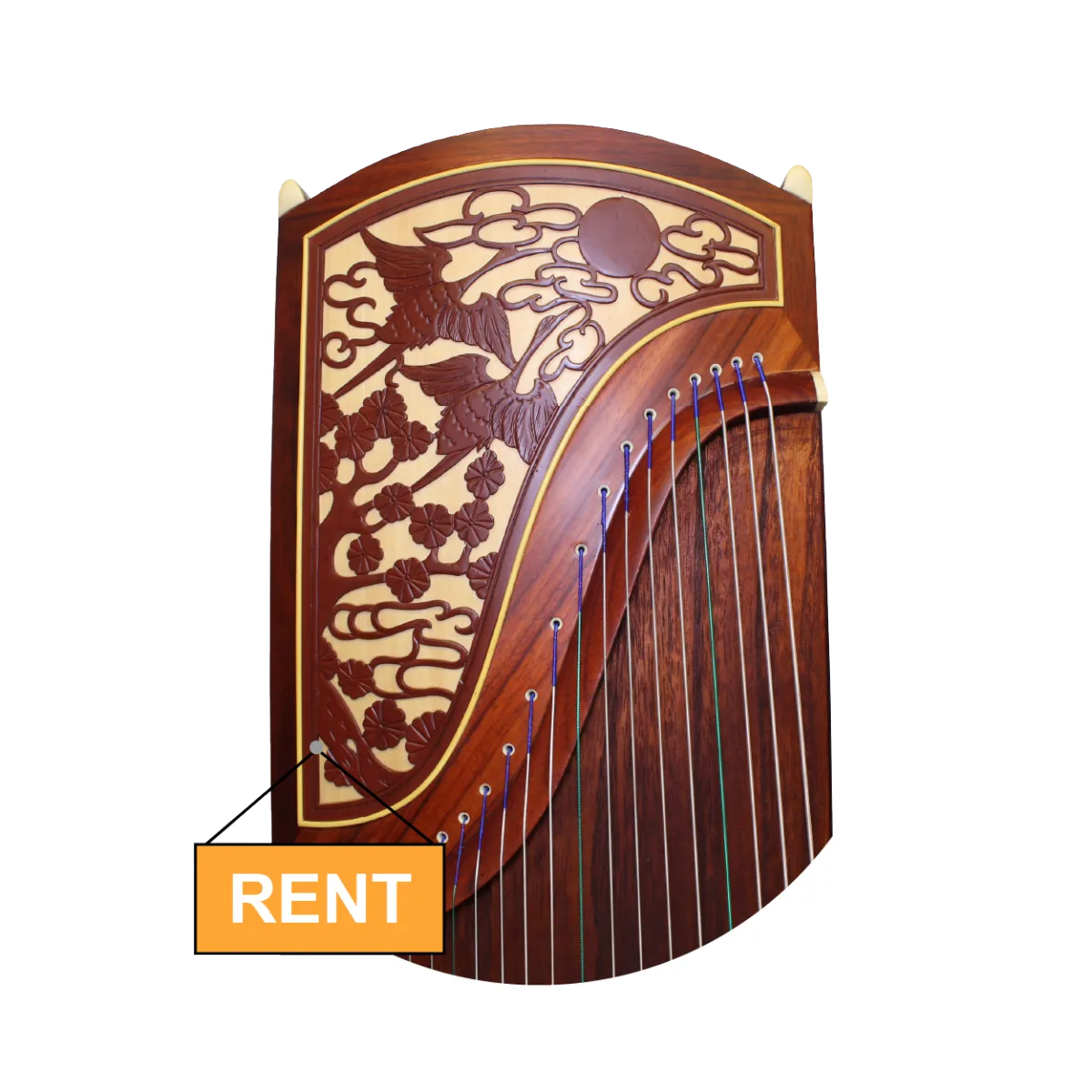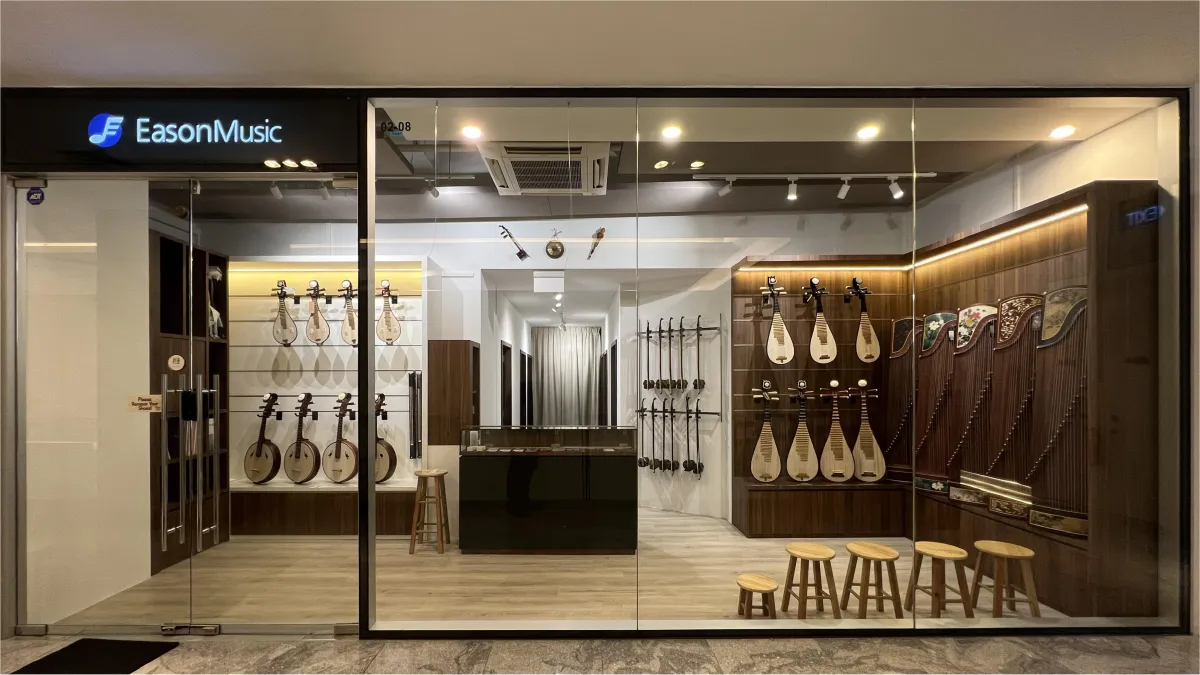
PLAY BEAUTIFUL GUZHENG SONGS
IN JUST 10 WEEKS —
Even If You're Starting From Zero
Join our cozy 3-pax group class and learn traditional Chinese music the fun, supportive way.
No experience? No problem. We'll guide you every step.
✅ No Experience Needed
🎶 Instrument Provided
👥 Only 3 Students Per Group
🎁 Free Beginner Kit
Here's What You Will Get
For just $397, here's what you can expect:
10 Weekly In-Person Group Lessons (3-pax max)
Use of In-Studio Guzheng (no need to buy yet)
FREE Starter Kit: Nails, Tape and Scores
Learn at Your Own Pace - No Prior Experience Needed
Small Group Setting – Get Personalized Attention
Whatsapp Group Support - For Questions
Supportive Community – Meet Like-Minded Music Lovers
Taught by Expert Guzheng Instructors
Certificate of Completion
Bonus: Exclusive Discounts on Instruments & Accessories
Class Schedules
Mon, Wed, Fri: 12pm - 1pm
Mon, Wed, Fri: 4pm - 5pm
Mon, Wed, Fri: 7pm - 8pm
Only $397 for the Full Course!
(Just $39.70 per lesson!)
Why Learn the Guzheng?

Sounds Beautiful
Enchanting and uniquely oriental sound

Hugely popular
Just like the piano, but its more 'IN'

Low maintenance instrument
Easy to tune and you can change strings yourself

Easy to learn
Pentatonic tuning means you sound good straight away

Very expressive instrument
With a myriad of unique techniques you can have a high level of expression

Light Weight
It is rather light despite its size!
Why Learn with Us?
6 Reasons to Learn with Us

FLEXIBLE time
Choose a class that fits you

GROUP lesson
Make friends & learn together

AWESOME teachers
Experienced, patient & passionate

FRIENDLY staff
Always ready to assist you

Established since 1978
Over 40 years of teaching excellence

Discounts for INSTRUMENT purchases
Get special deals on instruments & accessories

🎸 Need an Instrument? We’ve Got You Covered!
Guzheng Rental: $200 for the duration of the course (U.P. $300 + $500 deposit)
Pre-loved Guzheng: $300 to $450
8% Student discount for all new Guzhengs and music accessories
Practice Studio Rental: 10 hours for just $100 (U.P. $15/hr)
Meet Your Instructors
A student is only as good as her teacher. We only work with qualified and dedicated teachers.
Huang Ting Xuan
Huang Ting Xuan started learning the Guzheng at the age of 8. Over the course of learning the Guzheng, she had studied under Guzheng masters such as Luo Xun, Wang Wenhao, and XuHui.
In 2019, she graduated from Zhuhai Arts Senior High School, and further pursued her music education at Nanyang Academy of Fine Arts in Singapore, majoring in Guzheng.
Ting Xuan was one of the finalist in the 2022 Singapore Chinese Music Competition - Grand Category, where all the finest musicians wielding different instruments come together to compete.
Her future goals include learning many more pieces of different styles and genres and to improve her performance skills as she strives to become a splendid Guzheng teacher.

Chang Feng Yi
Mdm Chang Feng Yi currently holds a teacher’s diploma and boasts an extensive teaching experience, and she is deeply passionate about the Guzheng and teaching.
Mdm Chang started her music journey with ten years of piano studies during her primary school years. Upon moving to Singapore, her interest in Chinese music flourished, leading her to learning the Liuqin for six years under the guidance of Mr Lam Zi Peng.
Whether you are a beginner or looking to advance your skills, Mdm Chang Feng Yi's expertise and passion will guide you every step of the way. So come and join Mdm Chang for Guzheng lessons and embark on a fun learning journey that will enrich your appreciation and skills for the Guzheng.
TRY IT RISK FREE
100% Money Back Guarantee
If you attend your first class and feel it’s not for you, we’ll give you a full refund.
No awkward questions. Just peace of mind.

We are located at:
CT Hub Mall, #02-08, 2 Kallang Ave, Singapore 339407
Nearest MRT: Bendemeer, followed by Lavender
Buses: 13, 61, 67, 107, 133, 141, 145, 175, 961
Parking: Ample

Frequently Asked Questions
Is the Guzheng difficult to learn?
Definitely not! The Guzheng has 21 strings, and has a range of about 4 octaves. The strings are already tuned, hence the technique lies on just the plucking of the strings with the right hand. As you progress to higher grades, you might be required to use your left hand to press onto the strings to achieve the desired pitch, or to do vibrato, and even play a accompaniment with the left hand!
How do you play the Guzheng?
The Guzheng is played with nails, more commonly on the right hand. The nails are affixed on the thumb, index, middle and ring finger, specifically on the fleshy part of the finger, secured with a special tape. In higher grades, the left hand might be used to play accompaniment as well.

Why do Guzheng players wear fake nails?
If played just with the fingers, the Guzheng sounds muffled and muted. But with the help of fake nails, the sound produced is much clearer and crisp. Different nail material can produce different tone colour as well. The Guzheng nails also help to prevent blistering of the fingers, as some of the strings are very thick.
How does the Guzheng sound like?
The Guzheng sounds like a combination of the piano and harp, with bright and resonant plucked tones.
How is the Guzheng tuned?
The Guzheng has a compartment on the right most side, which can be opened. When opened, there should be 21 metal pegs, and they are tuned with a Guzheng tuning wrench. Pushing the wrench away tunes the Guzheng higher, while pulling the wrench towards you tunes the Guzheng lower. The notes are tuned to a pentatonic scale.
Is the Guzheng loud?
The Guzheng is capable of overpowering many instruments in the orchestra. The high notes of the Guzheng can be penetrative whereas the low notes are deep and sonorous. However, in general, the Guzheng can be loud but it will not be as loud as the wind instruments, Dizis, Shengs or the Suonas for instance.
How much does a Guzheng cost?
Guzhengs for beginners can cost from SGD$600 whereas higher end Guzhengs can cost up to the tens of thousands. The type of wood and method of making used in the making of the Guzheng play a huge part in price. Click here for our range of Guzhengs.
What's the difference between a high and low end Guzheng?
Differences between high and low ends are in sound are clarity, thickness and resonance. The low registers on low end Guzhengs tend to sound emptier and more hollow whereas the higher end Guzhengs have a thick, deep and sonorous quality that is capable of shaking your insides when played. On the higher registers, the lower end Guzhengs may not be as clear as those of higher ends.
What is the Guzheng made of?
Generally, the Guzheng, in a nutshell, is made of several pieces of woods put together. The wood used to make the top and the bottom of the sound box/chamber of the Guzheng are the same but are different compared to the rest for important reasons relating to acoustics and sound quality. The other sides of the Guzheng are made of the same type of wood. Yellow Sandalwood, Rosewood and Paulownia Wood are some of the many plethora types of woods used to make the Guzheng.
In special cases, a single piece of wood is used to make the whole Guzheng. For such, the amount of work put into the instrument by the craftsman and the tight standards needed for the materials are exponentially higher. As a result, the sound quality of these Guzhengs are much greater at the price of higher cost.
The image/design printed/inlaid at the top and the bottom of the Guzheng does not affect its sound in any way and is only for aesthetic purposes. These images may differ between Guzhengs and some may represent a part of the culture in China whereas others may be designed to cater the modern preferences of the market.
How big and heavy is the Guzheng?
The dimension of our Shanghai Dunhuang Guzhengs is 170cm x 40cm x 22cm (67.0in x 15.7in x 8.7in) and weighs about 10kg (about 22lbs).
What's the difference between Guzheng and Guqin?
Guzhengs seem much heavier and bulkier in person as compared to the portable Guqins.
You will also realise that Guzhengs have much more strings than Guqins (21 and 7 strings respectively). Hence, the Guzheng is more capable of producing a wider range of notes than the Guqin.
The Guzheng also sounds louder and resonant that the Guqin, due to the size difference. As the Guqin is lower in pitch, the volume of the Guqin is not as loud and bright. Thus, the Guqin will sound mellower while bringing a sense of tranquility to its timbre.
Techniques in the Guqin are said to focus on the left hand, whereas the right for Guzheng. Guqins only require a table to be played on, whereas the regular sized Guzhengs require a set of stands, as well as a set of fake nails to be worn in order to be played.
Ready to Start Your Guzheng Journey?
Limited Spots Available – Reserve Yours TODAY!

© 2025 Eason Music Pte Ltd - All Rights Reserved
admin@easonmusicschool.com
+65 9754 3879